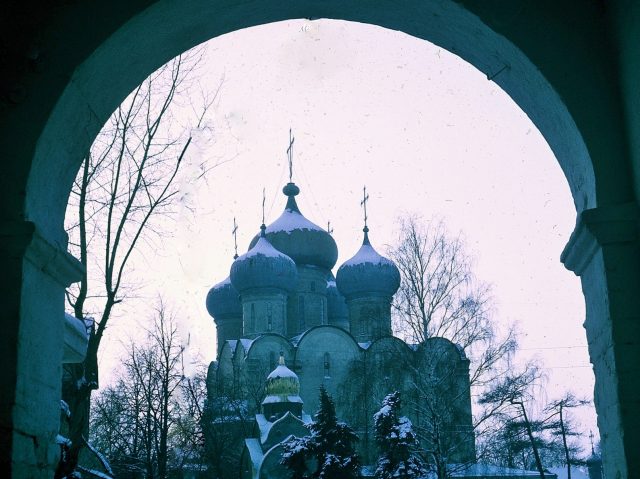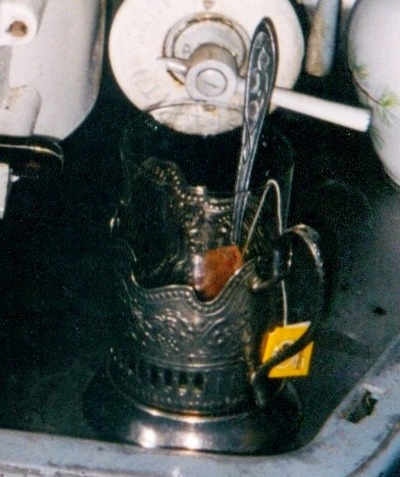 I watched the spires and onion domes of Yaroslavl whiz by… the crumbling infrastructure near the train station and then, finally, the Volga. We had traveled three days from the quaint Irkutsk station on the Baikal line. The train was clean and swept. There were few passengers. The “prevodnitsas” were quiet and efficient on the Baikal Line. They brought us steaming cups of “chascu chaiya,” the traditional way Russian tea was served in a glass with an ornate glass holder. We ate the Irkutsk feast of sausages, cheese and black bread that Jay cut up with his jack knife, homemade yogurt and big, yellow apples with a rosy blush from China… shared a bottle of wine.
I watched the spires and onion domes of Yaroslavl whiz by… the crumbling infrastructure near the train station and then, finally, the Volga. We had traveled three days from the quaint Irkutsk station on the Baikal line. The train was clean and swept. There were few passengers. The “prevodnitsas” were quiet and efficient on the Baikal Line. They brought us steaming cups of “chascu chaiya,” the traditional way Russian tea was served in a glass with an ornate glass holder. We ate the Irkutsk feast of sausages, cheese and black bread that Jay cut up with his jack knife, homemade yogurt and big, yellow apples with a rosy blush from China… shared a bottle of wine.
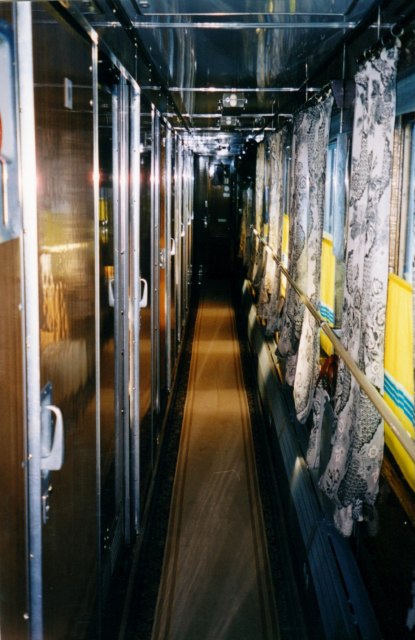 We crossed the Ob River over the famous railway bridge. Built in pre-revolutionary times, it was huge. I wondered how many people it had it taken to build such a structure. Had they been mere peasants… or had they been prisoners? The small wooden villages of Siberia disappeared slowly as we crossed over into the Urals. I expected dramatic peaks, but the Urals were simply hilly. I tried to catch sight of the Varykino Station. Perhaps Strelnikov would fly by on his train decked with red banners, but there was no evidence of the characters in Dr. Zhivago. Instead there were people catching trains in the gray snow. Many souls walked about the train stations and sidings. They were dressed in battered clothes, hats and babushkas. Some wore thick felt boots. Some were selling things. Others, who knows? Perhaps Gorky could have written about the lives of train station people, “The sad songs of smoldering souls, like ashes on the heart.” He had written that in “My Universities” about the Volga boatmen.
We crossed the Ob River over the famous railway bridge. Built in pre-revolutionary times, it was huge. I wondered how many people it had it taken to build such a structure. Had they been mere peasants… or had they been prisoners? The small wooden villages of Siberia disappeared slowly as we crossed over into the Urals. I expected dramatic peaks, but the Urals were simply hilly. I tried to catch sight of the Varykino Station. Perhaps Strelnikov would fly by on his train decked with red banners, but there was no evidence of the characters in Dr. Zhivago. Instead there were people catching trains in the gray snow. Many souls walked about the train stations and sidings. They were dressed in battered clothes, hats and babushkas. Some wore thick felt boots. Some were selling things. Others, who knows? Perhaps Gorky could have written about the lives of train station people, “The sad songs of smoldering souls, like ashes on the heart.” He had written that in “My Universities” about the Volga boatmen.
We arrived in the dreary Moscow station on the evening of the fourth day. Unseasonably warm, it alternately rained and froze on and off for the next three days. We slipped and slid through the streets of Moscow anyway. We drank cup after cup of coffee and watched Muscovites to distraction. I had been in Moscow at 19 during the coldest winter since the Russian invasion in World War II. I returned when I was 26 with my mother and father… Moscow so many years later, a commercial place that seemed embittered. Ardene Baatar had motioned with his hands that Moscow was very expensive. The money just flew out of our pockets. Unlike the old days when the swill served up by the most inexperienced waiters to tourists who simply knew no better, the food was good and varied, but expensive. Still, I could not find “chascu chaya” there. Sadly, except for purchases at the sidings, I could only find commercial tea bags in Moscow that I could have found in any grocery store in the West.
We visited GUM, the cavernous old Soviet department store. GUM now looked like a modern mall anywhere in the world. I saw some people looking, but few were buying. I had a GUM memory of my mother from the old Soviet days. She picked up a handkerchief to look at it. The sales clerk slapped her hand! My mother, in her most cultivated voice that she saved for these infrequent occasions, said, “Madame.” The clerk winced. My mother… drinking “chascu chaya” in Moscow with her… standing in Red Square enjoying the glow of St. Basil‘s at night… holding her hand… how I loved my mother that night.
My father died while we were on the train to Moscow. I told Jay after we visited an Internet café. We walked for a while in the cold evening streets and turned into a bar. He ordered a beer. I had a cup of tea and, as a second thought ordered a dish of fresh raspberries for us to share. I drank the tea. I ate the raspberries one by one. Both of us were very quiet. The bill came. The raspberries had cost 17 USD. What could we do but laugh and pay the bill? I will always be grateful for Jay’s quiet presence with me that night.
I wasn’t sure I could trust myself in a church on Sunday morning. My father had already been buried, but the choir drew me into a church just outside of Red Square. I stood through the service in the Russian Orthodox Church. I thought about how life changes… sometimes, so quickly. “Chto delat?” What can be done? I was in this church seeking personal resolution, yet I marveled at how historical events change people’s lives. W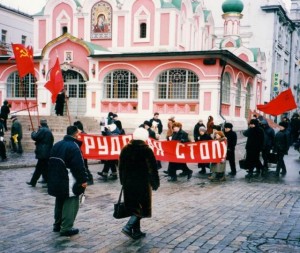 hat a wild, often tragic, ride the Russian people have had. I felt vulnerable in trying to understand the lessons of Russia… my political thoughts colliding with the fading of bourgeois sentimentality… the once-upon-a-time impermissable personal. As much as we would like control over our lives, we have little. A group of old Communists marched by the church with red banners singing the Internationale as I left.
hat a wild, often tragic, ride the Russian people have had. I felt vulnerable in trying to understand the lessons of Russia… my political thoughts colliding with the fading of bourgeois sentimentality… the once-upon-a-time impermissable personal. As much as we would like control over our lives, we have little. A group of old Communists marched by the church with red banners singing the Internationale as I left.
Jay and I took a walk in the Arbat… bought the usual Palekh boxes after wearily looking at what seemed to be thousands. We looked at old, useless Soviet military paraphernalia. We had been so relieved to have a break from China, but walking down this new Arbat Street with its casinos, tourist shops and kiosks only made me sad. We searched for signs 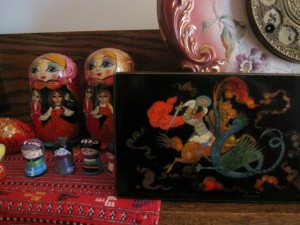 that said “Kitaiski Restoran”… Chinese Restaurant. We finally found a big, beautiful one lit up by neon lights. The Chinese waitresses didn’t speak Chinese and my Russian was so poor we could not make sense of the menu. No one spoke English. Finally, we asked for the chef to come out so that we could order in Chinese. We sat there for a long, long time. We had a deep, connecting conversation, but I can only remember a sense of what we really talked about. Midway into the conversation, it seemed as if we were both ready to return home to China.
that said “Kitaiski Restoran”… Chinese Restaurant. We finally found a big, beautiful one lit up by neon lights. The Chinese waitresses didn’t speak Chinese and my Russian was so poor we could not make sense of the menu. No one spoke English. Finally, we asked for the chef to come out so that we could order in Chinese. We sat there for a long, long time. We had a deep, connecting conversation, but I can only remember a sense of what we really talked about. Midway into the conversation, it seemed as if we were both ready to return home to China.
I indulged in one last memory. I had run the streets of Moscow and Leningrad at 19 in my sheepskin-lined leather coat, tall boots and mini-skirt. I visited Yuri the Long-Armed on Red Square, the Prince who had founded Moscow, and threw money at a place people had once been beheaded. The money flew through the air and landed with the bell sound of metal on stone. I had wished for a return to Moscow. I had blithely hopped in and out of taxis going here and there… run sliding and slipping on the cobblestones all the way back to the Rossiya from across Red Square with a dashing young man who pulled me along and made me jump like wild horses over a pile of neatly shoveled snow, my long hair escaping from under my hat… my hair covered with hoar frost whipping about my head like wispy icicles. I had spent New Year’s Eve in Moscow… seen the red stars on the Kremlin walls, their images blurred through the thick ice on the hotel windows. I had gone in search of troikas and was taken to the race track instead where I had found a Christmas tree… well, maybe back in those times, a New Year’s bush. I took it back to the hotel and, then, for the sheer joy of it, gave it away.

